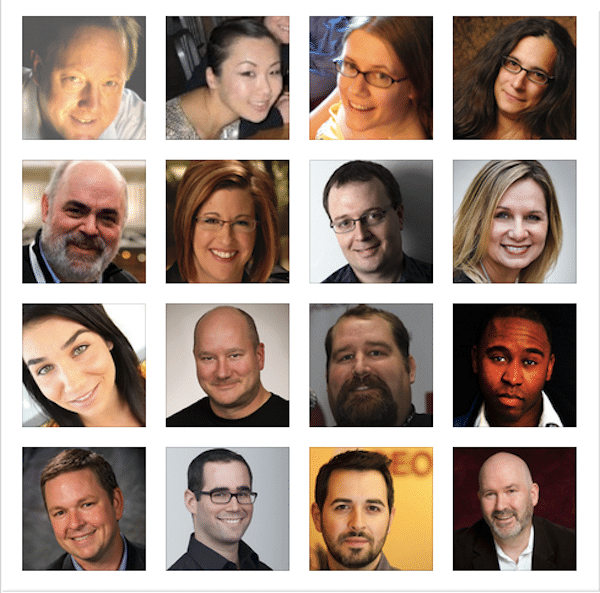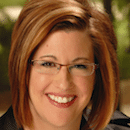Each month I get a number of cold-call inquiries, seeking advice and back-channel connections to help them get speaking gigs. I take each one seriously because in 2007 I recall seeking the very same sort of? input. Bill Hartzer, already an experienced online marketing conference speaker, told me to simply to pitch, that it?s a level playing field, there are no ?special ins,? just to keep trying. He was right. My experience over the years since then has almost always been that the best pitch wins. I pitched for about a year before getting my first opportunity.
We decided to follow our recent study of?women online marketing speakers?with immediately actionable advice, a road map, if you will, to support anyone interested in growing their speaking career. We reached out to experienced speakers who are at various stages of their careers, ranging from ?just had their first huge year? to ?been at it forever.? We also asked conference organizers to weigh in from their perspectives and provide conference pitch links. For the record, we reached out to an equal amount of men and women to participate. We hope you?ll find this a valuable resource. Certainly some of aimClear?s favorite speakers and conference organizers weigh in here. No matter what industry you?re in, there?s fantastic input here for budding speakers.?OK then, let?s meet our panel:

- Greg Jarboe, President and co-founder of SEO-PR
- Heather Lutze, Digital Marketing Expert & CEO at Findability Consulting & Speaking
- Marc Poirier, Co-Founder and CMO of Acquisio
- Matt Siltala, President and founder of Avalaunch Media
- Ian Lurie, CEO and founder of Portent, Inc.
- Lisa Grimm, Director of PR and Emerging Media at space150
- Michael King, Director of Inbound Marketing at iAcquire
- Amy Vernon, GM, Social Marketing, Internet Media Labs
- Will Scott, Search Influence
- Lisa Buyer, Social PR Evangelist, Editor of SocialPRChat and CEO of The Buyer Group.
- Aaron Friedman, SEO Manager at Spark Communications
- Erica McGillivray, Community Attach? at SEOmoz, Inc.
- Ric Dragon, CEO and co-founder of DragonSearch and author of Social Marketology
- Chris Sherman, Founding Editor, Search Engine Land
- Rand Fishkin, CEO, SEOmoz
- Anna Lee,?Conference Producer, SES Conference & Expo
- Andrew Goodman,??President, Page Zero Media
Without any further ado we?ll dive right into Q & A!
aimClear: Offer an idea or two to support aspiring speakers. If you are a speaker, talk about that. If you represent a conference, talk from that perspective. If you are both, speak from both, please ![]() .
.
 Greg Jarboe: There are two successful strategies for becoming a speaker. First, get there firstest with the mostest. In other words, the industry is always changing. So, identify a hot new topic that hasn?t been addressed at previous conferences and pitch it ? along with yourself as a speaker. Second, hit ?em where they ain?t. In other words, there are hundreds of qualified speakers on mainstream topics like SEO, PPC, or social media marketing. So, focus on emerging specialties like Content Marketing, Video Advertising, or Mobile Marketing.
Greg Jarboe: There are two successful strategies for becoming a speaker. First, get there firstest with the mostest. In other words, the industry is always changing. So, identify a hot new topic that hasn?t been addressed at previous conferences and pitch it ? along with yourself as a speaker. Second, hit ?em where they ain?t. In other words, there are hundreds of qualified speakers on mainstream topics like SEO, PPC, or social media marketing. So, focus on emerging specialties like Content Marketing, Video Advertising, or Mobile Marketing.
 Heather Lutze: What?s essential as a professional speaker is to not get too comfortable in any given conference circuit or niche. When I started in the speaking space for Yahoo! Search Marketing, I thought that training PPC experts was all I ever wanted to do. However, as I increased my speaking and came out of the ?tech? space, I realized that my material had been way too tactical for individuals outside of SES, SMX, etc. So as I evolved as a speaker, I learned how to speak inside the tech space, to CEO Groups as well as Associations. I customized the voice and the message for each of these different events.? Being adaptable and listening hard to the feedback you get from your attendees is essential to your growth and income as a speaker.
Heather Lutze: What?s essential as a professional speaker is to not get too comfortable in any given conference circuit or niche. When I started in the speaking space for Yahoo! Search Marketing, I thought that training PPC experts was all I ever wanted to do. However, as I increased my speaking and came out of the ?tech? space, I realized that my material had been way too tactical for individuals outside of SES, SMX, etc. So as I evolved as a speaker, I learned how to speak inside the tech space, to CEO Groups as well as Associations. I customized the voice and the message for each of these different events.? Being adaptable and listening hard to the feedback you get from your attendees is essential to your growth and income as a speaker.
 Marc Poirier: I?ve found that when I speak about real life stories of advertisers dealing with challenges and trying new things, and provide before and after data on the results, and then explain why they failed or succeeded, the audience feedback is extremely positive. So if I were to give anyone advice on speaking at conferences, it would be to come share interesting case studies with the audience so they can learn through your successes and failures. Nobody wants to hear a sales pitch when they pay to attend a conference, they expect to walk away with some new learning they can apply on the job. Theoretical presentations can be very good as well, but there?s nothing like taking the theory and applying it in real life, and then sharing the outcome with the audience.
Marc Poirier: I?ve found that when I speak about real life stories of advertisers dealing with challenges and trying new things, and provide before and after data on the results, and then explain why they failed or succeeded, the audience feedback is extremely positive. So if I were to give anyone advice on speaking at conferences, it would be to come share interesting case studies with the audience so they can learn through your successes and failures. Nobody wants to hear a sales pitch when they pay to attend a conference, they expect to walk away with some new learning they can apply on the job. Theoretical presentations can be very good as well, but there?s nothing like taking the theory and applying it in real life, and then sharing the outcome with the audience.
 Matt Siltala: My first piece of advice would be to get over your insecurities this instant. ?You may wonder what you have to offer, you may think because you don?t know any NEW and AMAZING tricks or ideas, that you have no reason to pitch. Get over this right now. ?Rely on the success that you have had with clients, your industry, or your own stuff and dig deep into that knowledge base. ?I would also suggest going to as many conference sessions related to what you are wanting to speak on. ?You will learn quickly (at least I did) that the speakers are no more advanced, and in some cases much more basic, than where you are at. ?Gain confidence this way and don?t doubt yourself. ?Final piece of advice would be to start smaller if you continue to worry about the bigger name conferences. ?I remember speaking at smaller ?local? conferences before my first ?big national named ones? and that gave me some amazing confidence. ?By doing this, I learned how to present better, and build better presentations. ?I am very grateful for Janet Thaeler (@newspapergrl), who now works for Avalaunch Media, for pushing me to speak back in 2006. ?She saw something in me, and knew I had something to say and gave me that push I needed.
Matt Siltala: My first piece of advice would be to get over your insecurities this instant. ?You may wonder what you have to offer, you may think because you don?t know any NEW and AMAZING tricks or ideas, that you have no reason to pitch. Get over this right now. ?Rely on the success that you have had with clients, your industry, or your own stuff and dig deep into that knowledge base. ?I would also suggest going to as many conference sessions related to what you are wanting to speak on. ?You will learn quickly (at least I did) that the speakers are no more advanced, and in some cases much more basic, than where you are at. ?Gain confidence this way and don?t doubt yourself. ?Final piece of advice would be to start smaller if you continue to worry about the bigger name conferences. ?I remember speaking at smaller ?local? conferences before my first ?big national named ones? and that gave me some amazing confidence. ?By doing this, I learned how to present better, and build better presentations. ?I am very grateful for Janet Thaeler (@newspapergrl), who now works for Avalaunch Media, for pushing me to speak back in 2006. ?She saw something in me, and knew I had something to say and gave me that push I needed.
 Ian Lurie:?About pitches? Don?t be afraid to have a personality. It makes speaking a lot more fun for you?and?your audience if your personality comes through. Even if it means fewer speaking opportunities in the near term, it?s worth it, because in the long run your speaking gigs will be more memorable, and you?ll enjoy it more. Don?t try to ?fit? a conference. Do give a pitch that?s relevant, clear and easily understood. Your job when you?re pitching isn?t to ?win? a pitch ? it?s to make it easy for a conference to decide if you?re someone who can add value to that specific event. That said, make sure you write a good pitch. I can?t imagine conference organizers want pitches with typos, bad grammar or random rambling.
Ian Lurie:?About pitches? Don?t be afraid to have a personality. It makes speaking a lot more fun for you?and?your audience if your personality comes through. Even if it means fewer speaking opportunities in the near term, it?s worth it, because in the long run your speaking gigs will be more memorable, and you?ll enjoy it more. Don?t try to ?fit? a conference. Do give a pitch that?s relevant, clear and easily understood. Your job when you?re pitching isn?t to ?win? a pitch ? it?s to make it easy for a conference to decide if you?re someone who can add value to that specific event. That said, make sure you write a good pitch. I can?t imagine conference organizers want pitches with typos, bad grammar or random rambling.
About building your profile?Part of speaking is about having a profile that conference organizers think might attract attendees. So, blog! Do some screencasts or audio content. Put stuff out there that builds a portfolio. There are so many benefits to this. Use this as an opportunity find your voice and your audience. Too few people have an opinion. So have one. But don?t just scream and shout. When you write, speak, etc. back up your opinions with evidence. And don?t be a jerk.
About speaking?With a few exceptions, do?not re-use presentations. Don?t give the exact same presentation again and again. Whenever I see someone do that I want to weep. Our industry changes so fast ? how can you possibly give the same presentation 3 times over a year?! Spare us all?Don?t be afraid to re-cycle, though. You can use ideas and concepts you?ve used before. Just make ?em relevant?Over-prepare. I usually create my presentation, go through it once, hate it, and re-do it. The second version is what I typically present. Afterward, I always think ?Geez, I did way more than I needed to.? But when I go onstage I?m so comfortable with the material I can focus purely on how I present it. That means I can have more fun with it.
 Lisa Grimm: Do good work. Build case studies. Create a platform to share them. I?ve always said, ?It?s all about who you know and how well you articulate what you know to who you know? that can make all the difference. I?m extremely passionate and driven about the intersection of technology and communication. You?ll know this about me if we have a?conversation, you read something I write or most importantly, through the results of my work. Passion, being extroverted and well-networked is beneficial, but nothing is more powerful than?doing good work?and the?results?your work generates. Solving a business (or other) problem, or attempting to, gives you a narrative from which you can build many things. Most notably, credibility, a reputation and case studies.
Lisa Grimm: Do good work. Build case studies. Create a platform to share them. I?ve always said, ?It?s all about who you know and how well you articulate what you know to who you know? that can make all the difference. I?m extremely passionate and driven about the intersection of technology and communication. You?ll know this about me if we have a?conversation, you read something I write or most importantly, through the results of my work. Passion, being extroverted and well-networked is beneficial, but nothing is more powerful than?doing good work?and the?results?your work generates. Solving a business (or other) problem, or attempting to, gives you a narrative from which you can build many things. Most notably, credibility, a reputation and case studies.
Case studies are my preferred speaking material because they establish your credibility immediately, give people a complete story from which actionable insights can be drawn and can fit or be supportive material for a?multitude?of topics. In my experience, case studies or proposals that have a strong case study component are attractive to conference organizers because they provide high value to the audience.
Having a strong network?and?social media presence?doesn?t hurt either. If you?re doing good work and?celebrating good work others are doing?in the same area, participate in those conversations on and offline. Publish your own content and connect with like-minded folks that may potentially be able to impact your career in positive ways. You never know who you?re talking to, so always be your best self. I can?t tell you how many times a casual interaction, where I?ve demonstrated knowledge about my work, has turned into a speaking?opportunity,?a quote in the newspaper about emerging media/tech or even a job?opportunity. ?When you do good work, word gets around and you may not even need to pitch a conference, they might call you. Those are always exciting emails, tweets and phone calls to receive.
 Michael King: I approach conference talks like any other content I create. I want to create a memorable, compelling, entertaining, unique and useful experience. I don?t offer to speak about things I?m not passionate about or that I can?t offer a new idea to. I also won?t repeat a deck unless someone specifically asks for it. I would suggest that any speaker looking to get into the game focus on these things. Deliver talks that tell stories, include data, a strategy and tactics that people can take home and implement. Focus first on the quality of your content and then focus on the delivery of that content and conference-goers will love you. After all, this is more about the people that spend their money to come learn things, so give them something they couldn?t find out by just reading SEO blogs all day.
Michael King: I approach conference talks like any other content I create. I want to create a memorable, compelling, entertaining, unique and useful experience. I don?t offer to speak about things I?m not passionate about or that I can?t offer a new idea to. I also won?t repeat a deck unless someone specifically asks for it. I would suggest that any speaker looking to get into the game focus on these things. Deliver talks that tell stories, include data, a strategy and tactics that people can take home and implement. Focus first on the quality of your content and then focus on the delivery of that content and conference-goers will love you. After all, this is more about the people that spend their money to come learn things, so give them something they couldn?t find out by just reading SEO blogs all day.
I don?t know if I believe that the best pitch always wins because as with anything there are a variety of factors outside of your control to affect whether or not you get picked. However, don?t get discouraged; if your pitch is that strong and it doesn?t get picked, just turn that content into a blog post or a webinar and post it on a site with a big audience. Eventually you will get noticed and people will pick you to speak. It also doesn?t hurt to buy the right people a drink.
 Amy Vernon: It is something that definitely becomes easier with time ? both easier to pitch and easier to get the gigs. Persistence is key, and willingness to speak to a group, no matter the size. Some of my early speaking gigs were at Social Media Club meetings, library groups and classes. I prepared presentations when it made sense, and just kept trying. The more I pitched, the easier it became to pitch. But also don?t be afraid to make use of those personal connections. While I agree that all pitches can be equal, your pitch sometimes does have a better chance being seen by the right person if there?s some sort of personal connection. MAKE those connections yourself. When you go to a conference, take the time to speak with and get to know the folks who put it together. That won?t guarantee you getting a speaking slot, but it will ring a bell when they see your pitch. Again, that doesn?t mean you will get the speaking gig, but it also can?t hurt.
Amy Vernon: It is something that definitely becomes easier with time ? both easier to pitch and easier to get the gigs. Persistence is key, and willingness to speak to a group, no matter the size. Some of my early speaking gigs were at Social Media Club meetings, library groups and classes. I prepared presentations when it made sense, and just kept trying. The more I pitched, the easier it became to pitch. But also don?t be afraid to make use of those personal connections. While I agree that all pitches can be equal, your pitch sometimes does have a better chance being seen by the right person if there?s some sort of personal connection. MAKE those connections yourself. When you go to a conference, take the time to speak with and get to know the folks who put it together. That won?t guarantee you getting a speaking slot, but it will ring a bell when they see your pitch. Again, that doesn?t mean you will get the speaking gig, but it also can?t hurt.
 Will Scott Keep it brief. But not so brief you don?t get the point across. The reviewers and moderators don?t have the time to read an essay. Stick to the high-points. Make it actionable. Use case studies, real-world examples and client success stories to show you?re planning to bring real knowledge. Demonstrate you?ve got the chops. Use your bio to make it clear this ain?t your first rodeo. If it is, demonstrate like experience and knowledge to show you?re not going to fold under the pressure of a mic in your face.
Will Scott Keep it brief. But not so brief you don?t get the point across. The reviewers and moderators don?t have the time to read an essay. Stick to the high-points. Make it actionable. Use case studies, real-world examples and client success stories to show you?re planning to bring real knowledge. Demonstrate you?ve got the chops. Use your bio to make it clear this ain?t your first rodeo. If it is, demonstrate like experience and knowledge to show you?re not going to fold under the pressure of a mic in your face.
 Lisa Buyer: Coming from a speaker, my advice is to attend the conference you want to speak at first, then scope out the agenda and other speakers to see how you can fit in with your content and expertise. If you can?t attend the actual conference then research on YouTube the conference coverage, speaker interviews and blog post coverage to see what was successful and well received. Check out the last few years? agenda and speakers. Look for gaps that are missing that might be a fit or ways your expertise can reinforce and complement another speaker?s expertise. Lastly, make sure you submit early! So many times I hear about people wanting to submit to speak but wait until the last minute and spots are already filled. Publish tweets supporting and promoting the conference as well as other speakers.
Lisa Buyer: Coming from a speaker, my advice is to attend the conference you want to speak at first, then scope out the agenda and other speakers to see how you can fit in with your content and expertise. If you can?t attend the actual conference then research on YouTube the conference coverage, speaker interviews and blog post coverage to see what was successful and well received. Check out the last few years? agenda and speakers. Look for gaps that are missing that might be a fit or ways your expertise can reinforce and complement another speaker?s expertise. Lastly, make sure you submit early! So many times I hear about people wanting to submit to speak but wait until the last minute and spots are already filled. Publish tweets supporting and promoting the conference as well as other speakers.
 Aaron Friedman: Speakers get picked because of how good their pitch is. I know the moderators are reviewing all the pitches that come in. But what else is important is to show and demonstrate that this is something you are good at, and passionate about. That could be from personal writing on your own, networking and taking advantage of every second at the conferences. Good conversation, and explaining an idea or a unique approach to something could sometimes be all you need to get your foot in the door (as long its coming from the right place). Study the people that are speaking. Learn from them. Review their slides and create decks of your own to tweak.
Aaron Friedman: Speakers get picked because of how good their pitch is. I know the moderators are reviewing all the pitches that come in. But what else is important is to show and demonstrate that this is something you are good at, and passionate about. That could be from personal writing on your own, networking and taking advantage of every second at the conferences. Good conversation, and explaining an idea or a unique approach to something could sometimes be all you need to get your foot in the door (as long its coming from the right place). Study the people that are speaking. Learn from them. Review their slides and create decks of your own to tweak.
 Erica McGillivray: Show off your work online and make sure you update it. As MozCon doesn?t accept pitches, I?m often scouring the internet for videos and slide decks from people?s past speaking experiences. Obviously, our team tries to see every speaker talk before we select them, but we can?t be everywhere. We also have times when we?re considering two people for a spot to talk about a topic and recent talks, decks, and blog posts often are what pushes one candidate over another. You?re awesome, and I want to know it.
Erica McGillivray: Show off your work online and make sure you update it. As MozCon doesn?t accept pitches, I?m often scouring the internet for videos and slide decks from people?s past speaking experiences. Obviously, our team tries to see every speaker talk before we select them, but we can?t be everywhere. We also have times when we?re considering two people for a spot to talk about a topic and recent talks, decks, and blog posts often are what pushes one candidate over another. You?re awesome, and I want to know it.
When you do get accepted, use all your resources from peers to graphic designers to conference runners.
With MozCon and I know most other conferences, conference runners want to support you to put forth your best material. If you?re struggling or rolling brilliantly with a topic or have a question about anything, don?t be afraid to reach out. I want all MozCon?s speakers to give the greatest presentations they?ve ever given in their lives. I also want them to come in to speak confident in their talk, their deck, their stage presence, and their ability to deliver what the audience is looking for and how that message fits with other speakers.
My least favorite thing ? and something I see as a partial failure of my own as that support system ? is when speakers tweak decks seconds before they walk on stage or deliver last minute decks. Our industry may change quickly and dramatically; but usually, it doesn?t change that quickly or dramatically. I know I?ve had a lot of MozCon speakers nervous about presenting the same information as the speakers before them. I completely understand wanting to have that unique, completely memorable talk and the pressure to do better than the speakers that came before you. But part of the conference runner?s job is to set the tone for topics and make sure that overlaps are cohesive, not?repetitive, and that every speaker shines in their own way. Deck deadlines are for more than just keeping our a/v team happy. You?re going to be amazing.
 Ric Dragon: When I read and heard Nancy Duarte talk about this activity of speaking, I underwent a radical change of view.?Duarte believes that in the best speaking, the presenter is setting out to help the audience go on their own hero?s journey ? and that a great talk is created to make change.
Ric Dragon: When I read and heard Nancy Duarte talk about this activity of speaking, I underwent a radical change of view.?Duarte believes that in the best speaking, the presenter is setting out to help the audience go on their own hero?s journey ? and that a great talk is created to make change.
Wait, what if I?m giving a PowerPoint on Google Panda updates? With those types of talks, I?m just teaching, right?? But what if I take another viewpoint ? that I REALLY WANT MY AUDIENCE TO SUCCEED WITH THEIR SEO? It changes the story ? I?m compelled to find the bigger underlying story. I?m not saying it?s not a challenge at times, but at the end of the day, your speaking will be the better for it. I?m a big believer in the ?paying it forward? philosophy ? that in speaking, I?m sharing back to my community.? I?m certain that good things will come of it ? that I might even help my organization create more business ? but it?s not WHY I?m doing it.? I just take that on faith ? I?m a speaker because it?s my job to share knowledge.
Sometimes you hear someone complaining about a speaker ? that the speaker was being self-promotional.? The second someone feels that your purpose is self-serving, trust flies out the window. Without trust, why should your audience take your word for anything? We?re exposed to great speaking constantly, although it may not be in the form of someone standing in the front of the room. Watch comedians, preachers, and anyone else who is telling a story.
My favorite mode of speaking is without slides or decks ? what I call ?going naked.?? In order to tell a cohesive story, I usually write out my thinking, and piece together a visual structure for myself.? I then use what?s called the ?memory palace?? ? in which I construct a visual journey for myself with various objects that represent different parts of my talk.
People are hard-wired to hear stories. We love stories.? The great science writer Stephen J. Gould started each of his essays with a small story.? Before you realized that he had totally hooked you, you were nodding your head and learning all about some arcane subject like the evolution of snails in Borneo. But he probably got you there through a smaller albeit relevant story.? Once you start using stories to illustrate other topics, you start looking for those stories everywhere.? An interaction you had this morning with a sales clerk might become an intro to your keynote speech this evening.
It?s natural to get nervous.? Teachers and professors tend to become great speakers because they stand in front of groups every day, speaking, and after a while they must just feel that every group of people is just an extension of the classroom. Speak every chance you get ? the Rotary, Chamber of Commerce, small groups of employees ? practice being comfortable speaking.
 Chris Sherman: My best advice for anyone wanting to speak at a conference is first, step back, get out of your own head, and put yourself in the position of the person or organization that?s responsible for selecting speakers. For SMX, that means first and foremost understanding our primary and most important goal: To offer outstanding value for the people who pay to attend SMX conferences ? full stop. We know speaking often leads to good opportunities for you, and we?re delighted if you gain business from speaking. But for every lead you garner you should also deliver excellent value for the other attendees that you may never see again. We want to know *specifically* how you propose to do that.
Chris Sherman: My best advice for anyone wanting to speak at a conference is first, step back, get out of your own head, and put yourself in the position of the person or organization that?s responsible for selecting speakers. For SMX, that means first and foremost understanding our primary and most important goal: To offer outstanding value for the people who pay to attend SMX conferences ? full stop. We know speaking often leads to good opportunities for you, and we?re delighted if you gain business from speaking. But for every lead you garner you should also deliver excellent value for the other attendees that you may never see again. We want to know *specifically* how you propose to do that.
That means, first and foremost, we want you to cast aside everything you know about self-promotion and PR and tell us, precisely, directly, and without fluff, what you?re going to freely offer to the people who attend your session. The tips, or timesavers or motivation that they can take away and put to work to amplify their own successes. The hard-won lessons you learned that can save them from making mistakes. Anything ? as long as it?s on-target for the session and focused on mentoring our attendees, providing them with something valuable that might take hours to discover on their own but that you?re offering in a relatively short presentation. Last and hindmost, we want to hear about you. That?s not to say your bio and accomplishments aren?t important factors in our decision process ? they are. But if someone who we don?t know wows us with a pitch and a veteran speaker just tosses together a few links to blog posts or rambles on about their past, counting on their reputation to carry the day, we?ll likely go with the unknown.
Second ? realize that the industry has matured. It?s not uncommon for us to receive 30 or more requests to speak on a panel that has just two or fewer openings. We have to make hard ? sometimes very hard ? choices. So even if you meticulously follow our guidelines and submit a great pitch, simple math says that we can only accept a small percentage of people who want to speak. Want an edge? Read, and re-read our guidelines and the?description of the?session ?that you?re pitching for?so that you have a really deep understanding of what we?re trying to accomplish, to the point that we *can?t* say no. And remember, if we do say no, this doesn?t mean we hate you ? in most cases these days it just means that we have limited availability.
Which brings me to my third suggestion ? be persistent. If you aren?t selected for a particular show, try, try again. We pay attention, and should you throw a great pitch we?ll remember, and you?ve also improved your odds of being selected in the future. But please note, being persistent doesn?t mean being pesty ? with all of the email our session coordinators deal with it?s impossible to reply on an individual basis if we don?t select your pitch.
This final point should go without saying, but to emphasize the obvious: When you have been accepted,?and on the day of the show you?re stepping up to the podium to speak, try to knock the ball out of the park. Don?t use bits and pieces from previous presentations ? stand up and deliver a world-class, original, fresh presentation. If you do, it goes without saying that our attendees will love you ? and to circle back to my first point, we?ll notice, and love that too.

Andrew Goodman:?Everyone?s different. Either you are on your way to becoming one of the most recognizable experts in a field, or just the opposite? or somewhere in between. How do you gain that kind of expertise? Well, you need exposure to opportunities to gain it ? so that is chicken-egg, isn?t it? So people fake it until they make it. Look at Scott Stratten, the un-marketing guy. This guy is a sought-after author and keynote speaker mostly because he had something to say, but partly because he nominated himself. It?s like Seth Godin says. ?Pick yourself.? You don?t need to sit around waiting for a publisher to accept your ?outline,? and you don?t need top conferences to accept you. But you need to begin the process of creation. Great material doesn?t come out of a small volume of material. It comes from regular production of material of varying quality.
You just keep writing and speaking in any venue that will have you. Smaller events. Private sessions. Etc.
Before you hit the speaking circuit, that includes giving presentations to clients. It includes picking subject matter for an internal seminar for your company, to bring colleagues up to speed on what they need to know. Do you attend conferences? Do you actively ask questions or participate in workshops? ?Speaking? isn?t something you just turn on like a light switch.
Being a great speaker isn?t about a couple of rehearsals, IMO. It?s about immersing yourself in a way of life: communicating constantly. Oversharing, even. ![]()
When one of my colleagues decided to improve her work on the speaking circuit, she really worked at it. In her spare time, she even took a course on how to do standup comedy, as an exercise! Imagining this formerly conservative communicator, writing her own original material comparing something about riding the subway with a stripper pole? was too hilarious. In any case, it took the ?edge? off her delivery style and got her in the habit of relating to people, not just spitting out bullet points.
When I hopped over to the business world to try and make an honest living, I came out of an academic career, a junior academic accustomed to giving lectures and tutorials to undergraduates on heady subject matter I needed to come up to speed on quickly. You can?t possibly write out a whole lecture and deliver it multiple times a week all term if you?re new/busy. So you learn to master the material, speak extemporaneously from notes & structure? and you get better at remembering important illustrations. You become capable of walking over to the whiteboard or chalkboard or overhead (that?s what we had in the ?90?s, still) and illustrating a point. And you do that multiple times a week.
In our world, it?s pretty easy by comparison, right? You have to be knowledgeable enough about your subject matter, and comfortable enough communicating and persuading people of your take on that subject, that you could go at least 15 minutes if the laptop blew up and Powerpoint was outlawed by the Feds (something I have been lobbying for for years).
If you?re interested in getting your feet wet as a speaker but you don?t feel 100% comfortable? Get on a live clinic. Pitch a new type of clinic. Beg to be on a clinic. Clinics rock, because they ?flow,? like soccer. They don?t sit their waiting for your backswing, like golf. You?re unlikely to be nervous in a clinic setting? rather, engaged.
aimClear: Speak to what aspiring speakers need to know.
Greg Jarboe: Aspiring speakers need to know something that other speakers aren?t already talking about. If lots of speakers are talking about Google AdWords, then learn the secrets of Bing Ads. If other speakers are already talking about Facebook or Twitter, then learn the secrets of LinkedIn or Pinterest.
Heather Lutze:?Speakers need to have independent credibility (books, thought leadership, C-Level Titles, success stories). Speakers must know their stuff and stay ahead of technology BUT keep translating back to less informed audience. Speakers need have a book, creates huge credit and meeting planners look for authors who are speakers. Speakers need easy guided handouts that match their presentation with an Action Plan at the end.
Matt Siltala: You have to be up to date in your industry, and there is really no way around this fact. ?You also need some basic graphic design skills, and of course you need to be good with Powerpoint or Keynote. ?I would suggest going to Slideshare and finding presentations related to your industry, find the top presentations and see what makes them amazing. ?Also, if you pitch and you get denied, pay attention to what conference organizers tell you. ?They often give really amazing advice for doing better next time. ?Even season veterans get denied for speaking because they didn?t do a good job pitching ? remember that. ? Another piece of advice is to be active in your respective communities. ?In order to drive in lots of business for their conferences, they are looking for those big names that can help them in those efforts. ?Find the big community blogs that you can be a contributing member of too. ?For example, in my industry some of the big ones would be Search Engine Land, Search Engine Journal and Search Engine Watch. ? Blog often and let people know (i.e. conference organizers) what you do, and what you are good at. ?Create the kind of content that is going to make people remember you when it is time to assign those coveted speaking slots.
Lisa Buyer: Think outside your industry box and be one of the few instead one of the many. If you are an SEO or PPC expert, submit to speak at a PR conference instead of an online?marketing?conference.
Erica McGillivray: Keep trying. We may not invite you this year, but there?s always the future. If your goal is to speak at a conference, even one like MozCon that doesn?t accept pitches, do something amazing that puts you on the fronts of our minds. As marketers, we often forget to market?ourselves?as we spend all day promoting others. ? But part of speaking is making sure that others can find and get to know you too.
If you are doing outreach to a specific conference, make sure you?re getting in touch with the people who are making the decisions and are the ones doing the research. There?s nothing like personalized outreach showing you?ve done your homework about what the conference is looking for.
Chris Sherman: We post our speaker guidelines in the following locations: ? A Guide To Speaking At SMX Conferences, SMX Suggestion Form,?and ?SMX ? Speaking Pitch Form. It?s astonishing how many people don?t bother to read our guidelines and really understand what we?re looking for (after having read literally thousands of pitches we can easily tell). At one point I actually got so exasperated that I wrote guidelines for The Best (Worst) Practices For NOT Being Invited To Speak At,?highlighting some of the common mistakes people make that totally drive us nuts. You should also have a thoughtful look at Matt?s Unofficial Tips for Pitching to Speak at SMX. Though ?unofficial,? it?s packed with excellent guidance from Search Engine Land Editor-in-Chief Matt McGee, who offers first-hand tips from having made the transition from pitching to speak to being part of the team who chooses speakers for SMX.
 Anna Lee:?If you want to speak at SES Conference & Expo, first things first, you need to submit. Once you fill out that submission form online, you are officially on our radar. But if you don?t submit?what can I say? Submitting is half the battle.
Anna Lee:?If you want to speak at SES Conference & Expo, first things first, you need to submit. Once you fill out that submission form online, you are officially on our radar. But if you don?t submit?what can I say? Submitting is half the battle.
?When it comes to the selection process, the content team here reads every single submission and here are my personal tips:?I?m keen to add a speaker, even a first timer, who has a fresh, innovative idea for a new session (or even a cool different slant on an existing session) ? somebody who is going to bring something thought-provoking and new to the table, who?s going to get people?s brain wheels turning, who?s going to get the conversations buzzing. I also look for speakers who make it clear they are going to provide plenty of tactics and takeaways in their presentations. Our attendees already know what they have to do and why they need to do it ? they just need to know?how?to do it (or how to do it better). So if you have plenty of tools and strategies to provide, you?re in a good spot.
?And if you really, really want a speaking gig at SES, here?s a little secret that will make us look at your submission much more favorably: Laura (Roth) is a big Malbec fan while I?m a Champagne or Whisky girl myself ? just saying. ![]()
aimClear: Speakers- where can we find you speaking next? Conference reps ? where?s your next show?
Greg Jarboe:?Pitch yourself for upcoming SES events: SES Shanghai:?Mar 29, 2013,?SES Toronto:?Apr 12, 2013,?SES San Francisco:?Jul 12, 2013,?SES Chicago:?Sep 13, 2013
Heather Lutze:?I am currently speaking at CEO groups like Vistage International across the US. I am also speaking at association events and other various associations. My speaking calendar is live on my site Findability,?as this helps meeting planners know my schedule.
Matt Siltala : My next gig is at SMX West, talking about Advanced Keyword Research with Christine Churchill and aimClear?s very own Marty Weintraub. ?You wanna talk about an intimidating speaking gig ? speak on any panel with Marty! Marty is an amazing speaker and continues to electrify and blow people?s mind. ?With that said, he is the most awesome person to present with as well because he listens and respects what you have to say. He does not make you feel un-worthy to be presenting with him.
Lisa Buyer: You can catch up with me speaking about The ROI of Visual PR at PubCon New Orleans in spotlight session and look for my upcoming book ? The Little Book of SocialPRSecrets.
Chris Sherman:?We start work on any given show about four months before the event. If you want to know what?s open or coming up, keep an eye on the SMX Blog- we always announce the opening and closing of pitch forms for our shows there. We?re currently accepting pitches for our SMX London show?for a few more weeks, and will begin the process again for SMX Advanced the week after SMX West wraps up in mid-March.
Amy Vernon:?I will be speaking next at SMX West, March 12th, on the topic of Social Media Automation.
Additional Resources From Our Panel:?
 Rand Fishkin: Here?s my presentation on Making Presentations Better .
Rand Fishkin: Here?s my presentation on Making Presentations Better .
Greg Jarobe:??I?m quoted in?Finding Your SEM Niche. I said, ?There is another strategy. Wee Willie Keeler: ?I keep my eyes clear and I hit ?em where they ain?t.? Part of finding your niche is finding what is not taken. Both Google and Yahoo have places on their site like Yahoo maps or Google local for mobile ? they are investing serious money ? so maybe that is a niche for you.?
Heather Lutze:?www.NSASpeaker.org?National Speakers Association has meant a six figure increase in my speaking career. I learned the difference between being a ?trainer? and being a ?speaker.?
Anna Lee:?Simon?Heseltine?recently wrote a?Guide To Speaking At Search & Social Conferences, published on?SearchEngineWatch.com
There you have it. Follow the advice and links in this post to get a serious leg up on competitors and come from a more holistic place.?Finally, many thanks to our 16 panelists for sharing such cool information. We hope to see you on the conference trail in 2013. Safe travels, everybody.
Post Image ? valdis torms ? Fotolia
Source: http://www.aimclearblog.com/2013/02/27/conference-speaker-advice/
sodastream dan marino godaddy did the groundhog see his shadow Ray Lewis Murder UFC 156 my bloody valentine
No comments:
Post a Comment
Note: Only a member of this blog may post a comment.